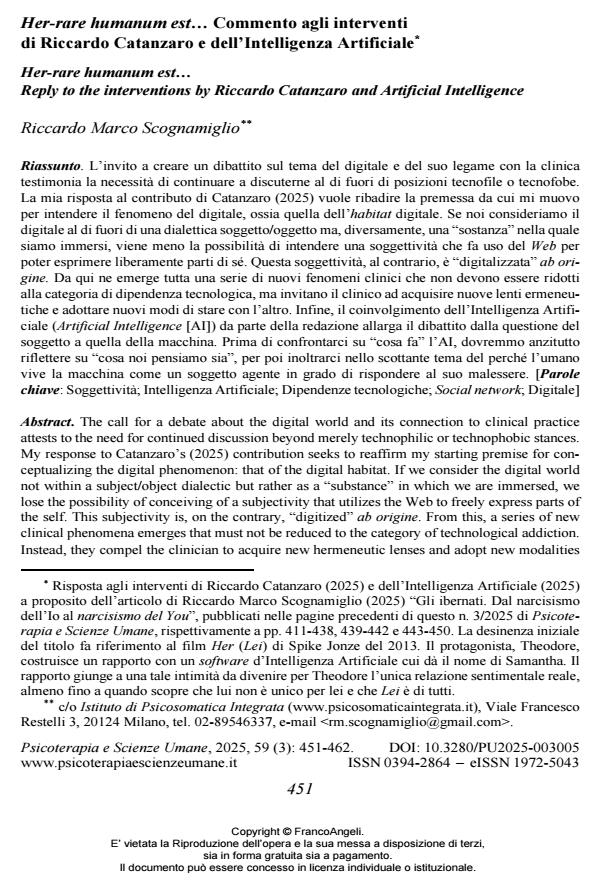Her-rare humanum est… Reply to the interventions by Riccardo Catanzaro and Artificial Intelligence
Journal title PSICOTERAPIA E SCIENZE UMANE
Author/s Riccardo Marco Scognamiglio
Publishing Year 2025 Issue 2025/3
Language Italian Pages 12 P. 451-462 File size 254 KB
DOI 10.3280/PU2025-003005
DOI is like a bar code for intellectual property: to have more infomation
click here
Below, you can see the article first page
If you want to buy this article in PDF format, you can do it, following the instructions to buy download credits

FrancoAngeli is member of Publishers International Linking Association, Inc (PILA), a not-for-profit association which run the CrossRef service enabling links to and from online scholarly content.
The call for a debate about the digital world and its connection to clinical practice attests to the need for continued discussion beyond merely technophilic or technophobic stances. My response to Catanzaro’s (2025) contribution seeks to reaffirm my starting premise for conceptualizing the digital phenomenon: that of the digital habitat. If we consider the digital world not within a subject/object dialectic but rather as a “substance” in which we are immersed, we lose the possibility of conceiving of a subjectivity that utilizes the Web to freely express parts of the self. This subjectivity is, on the contrary, “digitized” ab origine. From this, a series of new clinical phenomena emerges that must not be reduced to the category of technological addiction. Instead, they compel the clinician to acquire new hermeneutic lenses and adopt new modalities of being with the other. Finally, the editorial team’s inclusion of Artificial Intelligence (AI) expands the debate from the question of the subject to that of the machine. Before we address “what AI does”, we must first reflect on “what we perceive it to be”. Only then can we venture into the critical issue of why the human subjects experience the machine as an agentive entity capable of responding to their own malaise.
Keywords: Subjectivity; Artificial Intelligence; Technological addictions; Social networks; Digital
Riccardo Marco Scognamiglio, Her-rare humanum est… Commento agli interventi di Riccardo Catanzaro e dell’Intelligenza Artificiale in "PSICOTERAPIA E SCIENZE UMANE" 3/2025, pp 451-462, DOI: 10.3280/PU2025-003005